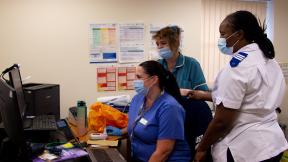National Engagement Service
NHS Employers' national engagement service comprises four regional teams: London, Midlands and East, North, and South.
We work alongside employers, supporting them to develop a sustainable workforce, improve staff experience and be the best employer they can be. We know that this is the key ingredient to providing excellent high-quality care.
Our operating model continues to be refined to take account of the changing health and care system landscape and the needs of our key stakeholders. Currently each geographical region across the country (North, Midlands and East, London and South) has its own designated assistant director of engagement lead that is supported by a small team to deliver engagement and communications activities.
Each team has its own network of HR directors and together they provide an engagement service that covers the whole of England.







